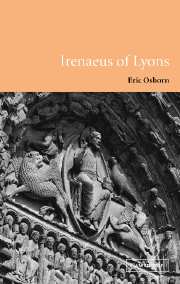Book contents
- Frontmatter
- Contents
- Preface
- List of abbreviations
- Chapter 1 Irenaeus: argument and imagery
- Part I DIVINE INTELLECT
- Part II ECONOMY
- Part III RECAPITULATION
- Chapter 5 Recapitulation: correction and perfection
- Chapter 6 Recapitulation: inauguration and consummation
- Part IV PARTICIPATION
- Part V CONCLUSION
- Appendix: Gnosticism
- Select bibliography
- Citations from Irenaeus
- Citations from the bible
- Index of classical authors
- Index of patristic authors
- General index
Chapter 5 - Recapitulation: correction and perfection
Published online by Cambridge University Press: 22 September 2009
- Frontmatter
- Contents
- Preface
- List of abbreviations
- Chapter 1 Irenaeus: argument and imagery
- Part I DIVINE INTELLECT
- Part II ECONOMY
- Part III RECAPITULATION
- Chapter 5 Recapitulation: correction and perfection
- Chapter 6 Recapitulation: inauguration and consummation
- Part IV PARTICIPATION
- Part V CONCLUSION
- Appendix: Gnosticism
- Select bibliography
- Citations from Irenaeus
- Citations from the bible
- Index of classical authors
- Index of patristic authors
- General index
Summary
Recapitulation, summing up, does four things. It corrects and perfects mankind; it inaugurates and consummates a new humanity. This chapter looks at correction and perfection as the work of Christ and at the consequence for the person of Christ. The work of Christ corrects and perfects being, truth and goodness. The person of Christ as corrector and perfecter is described as new Adam, divine word, only mediator, son of the father and bearer of the name above all other names.
RECAPITULATION, A COMPLEX CONCEPT
The idea of recapitulation dominates the theology of the second century. Adumbrated by Justin, it is expounded endlessly by Irenaeus and given decisive place in Tertullian. Clement of Alexandria later takes the important step of uniting it to the Platonic Intellect so that Christian theology becomes biblical and Platonic without a break (str. 4.25.156–7): a move which begins from the cosmic theology of Irenaeus in Book 2 of Adversus haereses is modified by recapitulation so that the son is divine Intellect and the father is the ineffable One.
The complexity of the concept is formidable. At least eleven ideas – unification, repetition, redemption, perfection, inauguration and consummation, totality, the triumph of Christus Victor, ontology, epistemology and ethics (or being, truth and goodness) – are combined in different permutations. Are all these ideas necessary to the concept? Even together they are an understatement, because everything that God does is part of his economy and every part of his economy is defined in relation to its recapitulation.
Information
- Type
- Chapter
- Information
- Irenaeus of Lyons , pp. 97 - 116Publisher: Cambridge University PressPrint publication year: 2001
